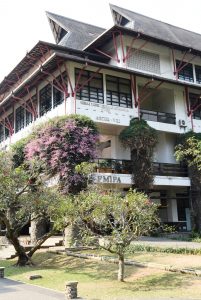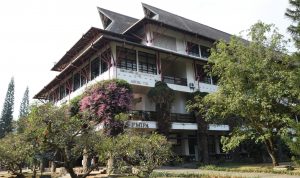 Faculty of Mathematics and Natural Sciences (FMIPA) is the oldest and leading faculty in Indonesia in the field of mathematics and natural sciences. It was established on October 6, 1947, as Faculteit van Exacte Wetenschap. On September 22, 1948, the name of this faculty changed to Faculteit van Wiskunde en Natuur Wetenschap. In 1950 it changed to the Faculty of Science and Natural Sciences (FIPIA), and from 1972 until now it has changed to the Faculty of Mathematics and Natural Sciences (FMIPA).
Faculty of Mathematics and Natural Sciences (FMIPA) is the oldest and leading faculty in Indonesia in the field of mathematics and natural sciences. It was established on October 6, 1947, as Faculteit van Exacte Wetenschap. On September 22, 1948, the name of this faculty changed to Faculteit van Wiskunde en Natuur Wetenschap. In 1950 it changed to the Faculty of Science and Natural Sciences (FIPIA), and from 1972 until now it has changed to the Faculty of Mathematics and Natural Sciences (FMIPA).
FMIPA is one of 12 faculties/schools at Institut Teknologi Bandung (ITB). Currently, FMIPA organizes the best education at the undergraduate, master, and doctoral levels with international quality to produce graduates with character and global competitiveness. The total number of students is 2320, consisting of 1559 undergraduate students, 533 master students, and 228 doctoral students. It consists of four undergraduate study programs, namely undergraduate study programs in Mathematics, Astronomy, and Physics which are internationally accredited by the prestigious accreditation agency Akkreditierungsagentur für Studiengänge der Ingenieurwissenschaften, der Informatik, der Naturwissenschaften und der Mathematik (ASIIN) from Germany since 2015 and an undergraduate study program in Chemistry accredited by Royal Society of Chemistry (RSC) from the UK since 2013. Graduates of these four undergraduate study programs mostly work as reliable professionals, ready to develop and work in various professional fields and occupy important positions in their work. In addition, the percentage of productive entrepreneur is increasing every year. Starting in 2019, FMIPA also organized an Actuarial Undergraduate Study Program to meet national and regional needs.
The master's level postgraduate study programs offered include master's programs in Actuarial, Mathematics, Astronomy, Physics, Chemistry, Computational Science, Mathematics Teaching, Physics Teaching, and Chemistry Teaching. Meanwhile, the doctoral-level postgraduate study programs consist of doctoral programs in Mathematics, Astronomy, Physics, and Chemistry. All of these postgraduate study programs are accredited by the National Accreditation Board for Higher Education (BAN-PT) with very good predicates. In addition, they have also produced graduates who work as scientists, researchers, or practitioners who are reliable in the fields of science and mathematics spread across various universities, research, and educational institutions in Indonesia and abroad. The master's and doctoral study programs are also equipped with double-degree programs and/or sandwich programs. Starting in 2019, FMIPA also opened a master's program in Nuclear Science and Engineering and a doctoral program in Nuclear Engineering.
Currently, FMIPA ITB has 210 permanent lecturers, 39 of whom are professors and at least 86% have doctoral degrees obtained from various foreign universities. To carry out quality and leading-edge research in mathematics and science, FMIPA ITB is strengthened by 16 Scientific Groups/Skills, namely: Astronomy, Algebra, Analysis and Geometry, Combinatorics Mathematics, Industrial and Financial Mathematics, Statistics, Biochemistry, Analytical Chemistry, Inorganic and Physical Chemistry, Organic Chemistry, Physics of the Earth and Complex Systems, Electronic Physics of Materials, Theoretical Physics of High Energy, Instrumentation and Computational Physics, Nuclear Physics and Biophysics, and Magnetism and Photonics Physics.
foreign universities. To carry out quality and leading-edge research in mathematics and science, FMIPA ITB is strengthened by 16 Scientific Groups/Skills, namely: Astronomy, Algebra, Analysis and Geometry, Combinatorics Mathematics, Industrial and Financial Mathematics, Statistics, Biochemistry, Analytical Chemistry, Inorganic and Physical Chemistry, Organic Chemistry, Physics of the Earth and Complex Systems, Electronic Physics of Materials, Theoretical Physics of High Energy, Instrumentation and Computational Physics, Nuclear Physics and Biophysics, and Magnetism and Photonics Physics.
As one of the network of mathematics and science development at regional and international levels, FMIPA ITB has gained significant recognition from the global community. This is shown by the increasing number of educational and research collaborations with renowned and leading universities at the regional and international levels. In addition, FMIPA ITB is also honored by the willingness of several (Nobel Laureate) world figuresto becomeHonorary Professor) at FMIPA ITB, namely Prof. Gerardus 't Hooft (Nobel Laureate) world figures in Astrophysics), Prof. Peter Agre (Nobel Laureate) world figures in Biochemistry), Prof. Matthew Colles (Astronomical Scientist, ANU Australia) and Prof. Dr. Ralph H.. Prof. Hiroshi Sekimoto (Nuclear Physics Scientist, Japan), and Prof. Hadi Susanto (Mathematician, Univ. Essex, UK).

